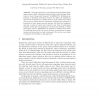Free Online Productivity Tools
i2Speak
i2Symbol
i2OCR
iTex2Img
iWeb2Print
iWeb2Shot
i2Type
iPdf2Split
iPdf2Merge
i2Bopomofo
i2Arabic
i2Style
i2Image
i2PDF
iLatex2Rtf
Sci2ools
132
click to vote
WRAC
2005
Springer
2005
Springer
Distributed Agent Evolution with Dynamic Adaptation to Local Unexpected Scenarios
Abstract. This paper introduces a novel framework for designing multiagent systems, called “Distributed Agent Evolution with Dynamic Adaptation to Local Unexpected Scenarios” (DAEDALUS). Traditional approaches to designing multi-agent systems are offline (in simulation), and assume the presence of a global observer. In the online (real world), there may be no global observer, performance feedback may be delayed or perturbed by noise, agents may only interact with their local neighbors, and only a subset of agents may experience any form of performance feedback. Under these circumstances, it is much more difficult to design multi-agent systems. DAEDALUS is designed to address these issues, by mimicking more closely the actual dynamics of populations of agents moving and interacting in a task environment. We use two case studies to illustrate the feasibility of this approach.
Artificial Intelligence | Global Observer | Multi-agent Systems | Performance Feedback | WRAC 2005 |
Related Content
| Added | 28 Jun 2010 |
| Updated | 28 Jun 2010 |
| Type | Conference |
| Year | 2005 |
| Where | WRAC |
| Authors | Suranga Hettiarachchi, William M. Spears, Derek Green, Wesley Kerr |
Comments (0)

